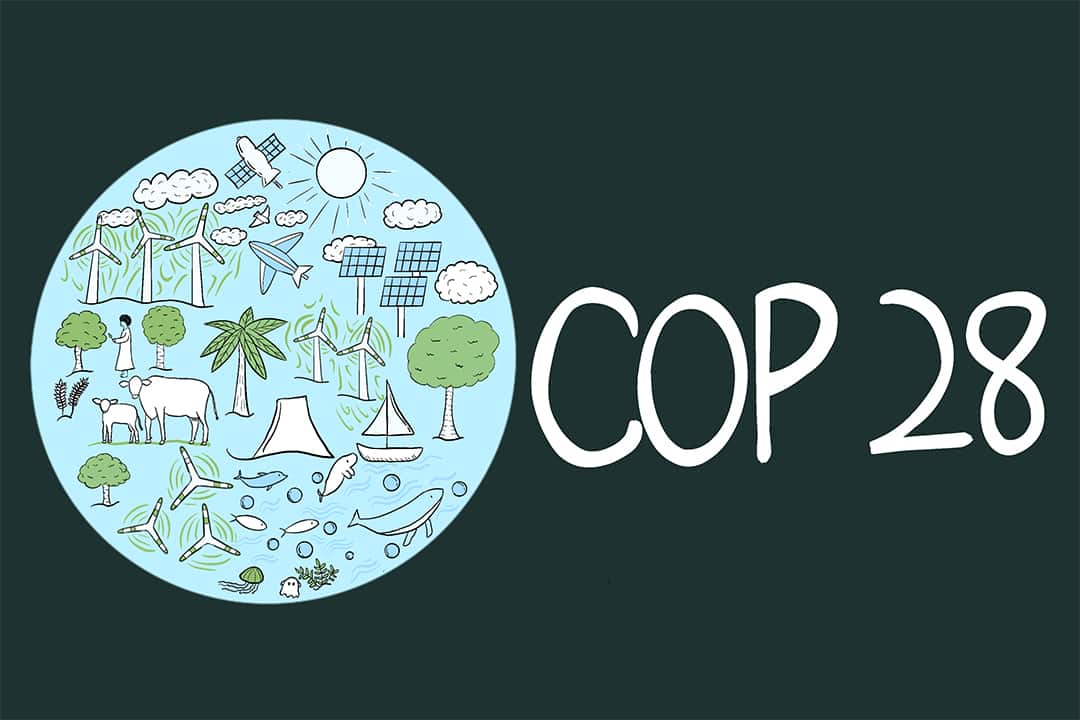The 28th United Nations (UN) Climate Change Conference — also called The Conference of the Parties, or COP28 — took place from November 30 to December 13, 2023. It was hosted in Dubai, United Arab Emirates (UAE) and was attended by over 85,000 diplomats, scientists, industry leaders, and journalists.
The UN has been holding COP conferences since 1995, originally conceived as a meeting point for countries who were signing members of the UN Framework Convention on Climate Change (UNFCCC). COPs have been the site of many important climate agreements, including the 1997 Kyoto Protocol and the 2015 Paris Agreement.
This conference, like many previous COPs, was hardly without controversy.
A questionable chair
Given the UNFCCC’s stated goals, which include “stabilization of greenhouse gas concentrations in the atmosphere,” the choice of Dubai as a venue for COP28 seems a bit ill-suited. The UAE, a Gulf state, has an enormous oil sector and has the second highest oil production per capita as of 2022. Further, the entire conference was presided over by the Emirati Minister of Industry and CEO of the Abu Dhabi National Oil Company, Sultan al-Jaber.
Isn’t it a conflict of interest to hold a crucial climate conference in a historically oil-driven nation, chaired by an oil executive? Many were quick to argue so. Amnesty International, an advocacy group for human rights, called al-Jaber’s career plans “incompatible with his role as president-designate of COP28.”
The Climate Reality Project, an international climate education and advocacy group, found al-Jaber’s appointment “alarming” and demanded his resignation through an online petition, saying, “We’re overdue for a global commitment to phase out fossil fuels, and we can’t trust an oil CEO to effectively secure that commitment. It’s that simple.”
The methane conversation
A major point of discussion at COP28 was the issue of methane emissions. Methane — the carbon-based molecule that we use as natural gas — is a greenhouse gas that traps heat in our atmosphere, like carbon dioxide. The two largest human sources of methane emissions are leaks during the processing and transport of natural gas and agricultural livestock.
Though it dissipates faster, methane is a far more potent greenhouse gas than carbon dioxide, as it traps heat in the atmosphere much more effectively. This makes methane pollution a critical issue.
At COP28, participating nations resolved to address the excess methane release from the oil and gas industries but failed to propose any plans to reduce livestock emissions. Still, this is significant because dozens of fossil fuel companies from across the world agreed to sign a methane pledge, which, among other things, binds oil and gas giants into cutting methane emissions by 30 per cent by 2030. Such reductions would have a notable positive impact on the global climate.
Some questioned the virtues behind oil companies pledging to reduce emissions. An open letter released by over 300 organizations, spearheaded by Oil Change International and 350.org, criticized COP28, arguing that “cutting methane pollution from the oil and gas supply chain is an important component of near-term emissions reductions – but it is not enough on its own.”
Supporting victims of climate change
At this point in the climate crisis, addressing climate change requires more than just reducing greenhouse gas emissions. It means working to prepare for the damage that climate change will do, not to mention the damage it has already done.
In 2022, at COP27, the parties to the conference agreed to establish a “loss and damage fund” to assist vulnerable people, mostly in countries that would feel the impacts of climate change first and hardest. These funds would be used to assist victims of disasters and climate refugees.
However, the nature of the fund took some time to negotiate, and so COP28 marked the first time that member countries actually made pledges to the fund. The Guardian noted that the $700 million pledged by nations at the conference will be able to cover less than 0.2 per cent of the estimated $400 billion of economic loss caused by climate change.
An optimistic future?
In COP28’s final report, the conference parties made overt calls for “the phase-down of unabated coal power” and “transitioning away from fossil fuels in energy systems.” The message is noble, but these calls to action lack timelines and clear definitions.
Undeniably, positive work was done at COP28 — but it was not without issues. Between commitments with grave oversights, relief funds not meeting their organizers’ goals, and a president who was perhaps not the ideal fit to oversee a climate conference, the United Nations Climate Change Conference in 2023 was steeped in controversy.
However, as the world moves to the ever-more-pressing issue of global change, international cooperation is key. Carbon emissions continue to rise globally. Addressing global change, no doubt, requires extensive global collaboration, but we need a specific and measurable plan to reduce methane emissions to reach the goals addressed at COP28.



No comments to display.